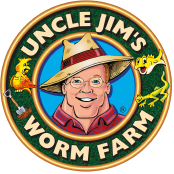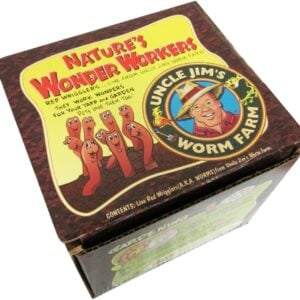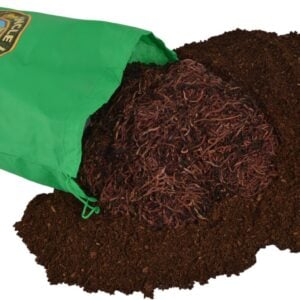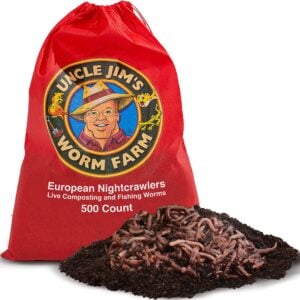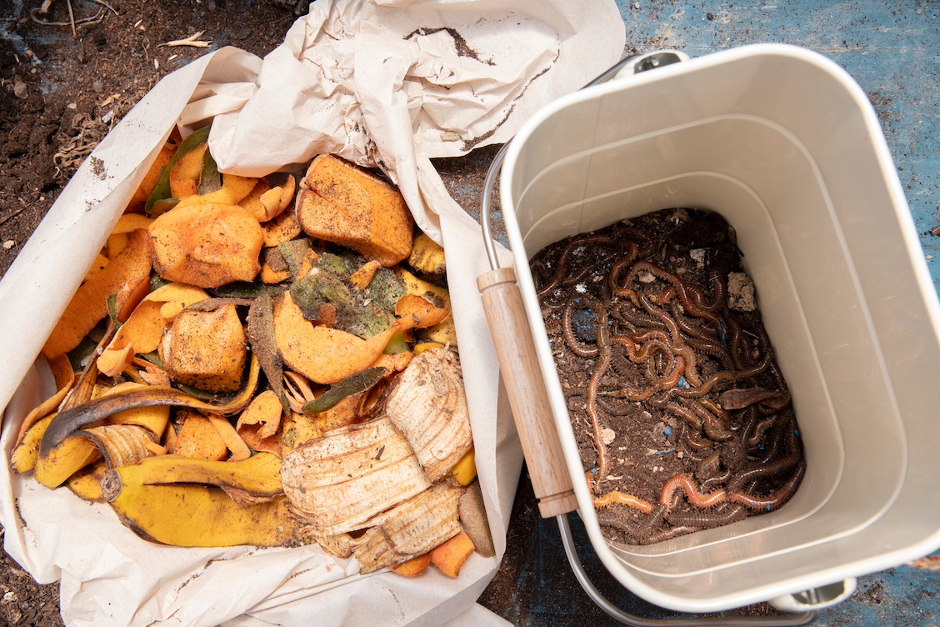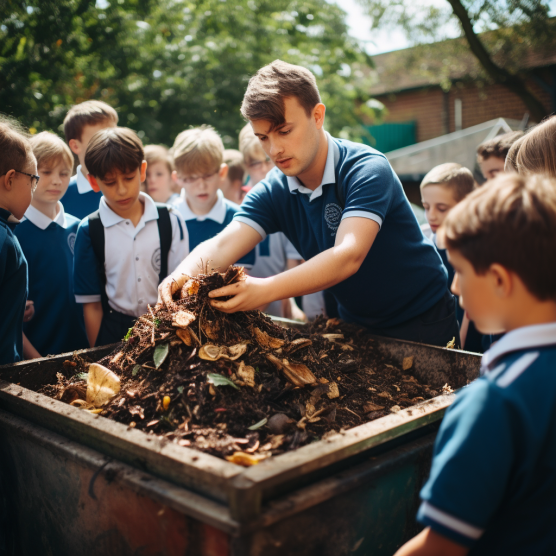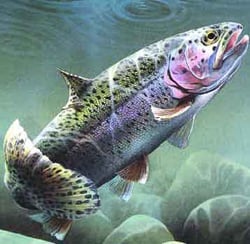Vermicomposting definitely isn’t a new practice. We’ve been doing it here at Uncle Jim’s for decades. But with the global push for sustainability and with eco-friendly practices growing in popularity, people are finally coming around and acknowledging the environmental benefits of red wiggler worms and composting.
In this article, we’ll discuss how vermicomposting supports sustainable gardening and the environmental benefits of red wigglers and other earthworms. But before we get to that, let’s cover our bases and give a quick overview of vermicomposting.
What Is Vermicomposting?
Vermicomposting is the process of creating organic fertilizer with earthworms, red wiggles most often. In the simplest of terms, you feed your worms organic scraps, they poop and crate worm castings, this enriches the soil where they live, and you get vermicompost – a natural, eco-friendly fertilizer.
Red Worms and Red Wigglers: The Heroes of Vermicomposting
Let’s get to know our little allies better. Red wigglers, scientifically known as Eisenia fetida are nature’s waste-processing marvels. These worms are well-suited for composting because of their voracious appetite – they’ll eat just about any organic matter – and hardworking nature.
Lifecycle and Efficiency
The life of a red wiggler worm is a fascinating journey. From hatching as tiny cocoons, these worms grow into adults within two to three months. They’re efficient breeders, laying numerous eggs that eventually hatch into more composting champions.
Their rapid reproduction ensures a thriving worm population, making them ideal for breaking down organic matter at a speedy rate. This is the short of it. If you want to read in-depth about red wiggles, we have a whole article dedicated to them here.
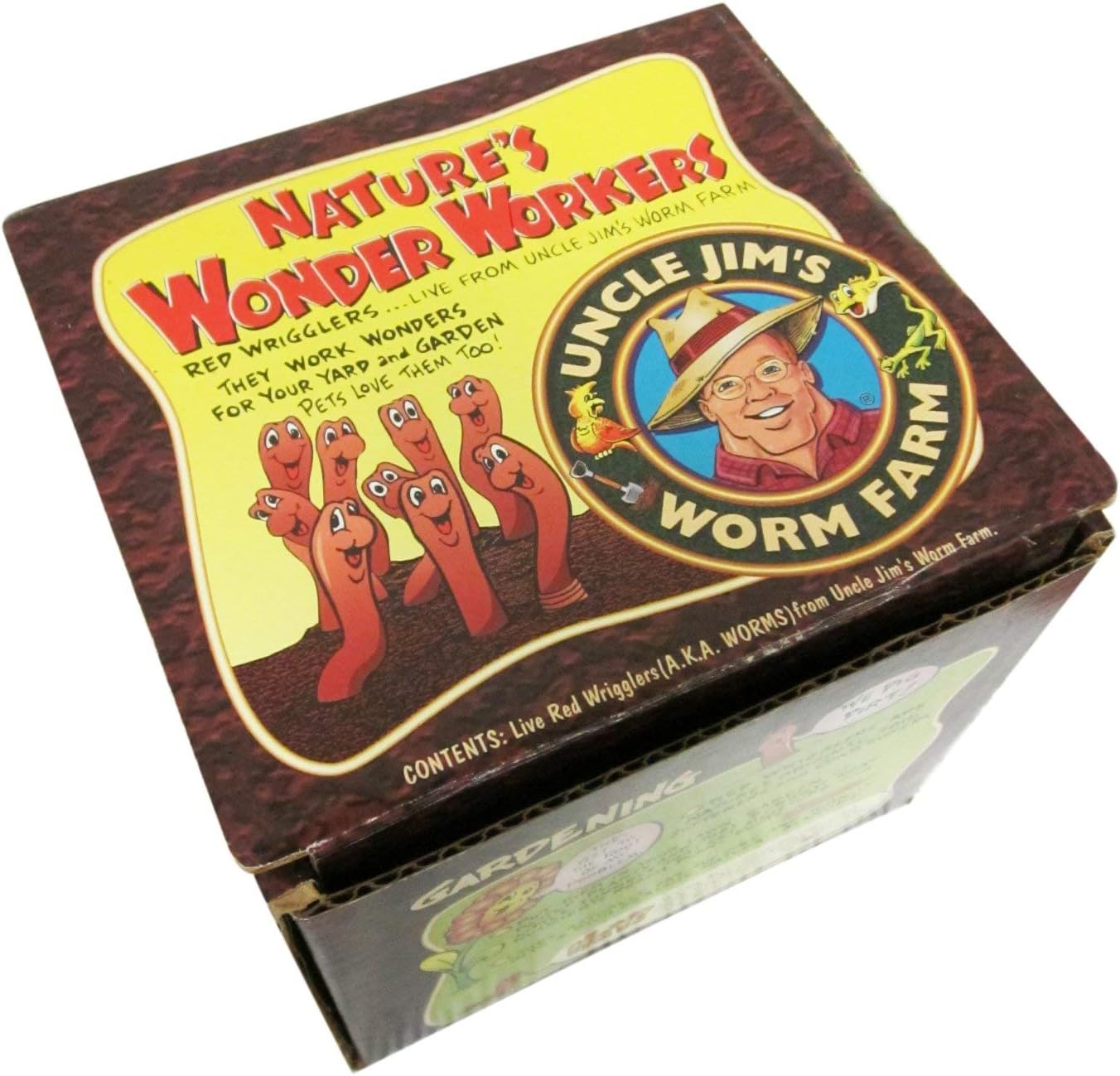
Environmental Benefits of Red Wiggler Worms
Now, let’s get into the nitty-gritty of how these worms support sustainable gardening practices and benefit the environment:
1. Soil Enrichment
Worm composting is like a spa day for your soil. These little wrigglers work tirelessly to break down organic matter into nutrient-rich castings (worm poop). When incorporated into your garden soil, these castings improve its structure, aeration, and water retention. This helps with plant growth and health and does not require the use of any chemicals.
2. Waste Reduction
Did you know that organic waste makes up a significant portion of landfill material? And decomposing organic waste in landfills creates large amounts of landfill gas (LFG), which is comprised of about 50% CO2 and 50% methane – a greenhouse gas approximately 28 more powerful than CO2.
Red worms and red wigglers are here to change that. By diverting your kitchen scraps and yard waste into a worm composting bin, you’re effectively reducing the amount of organic waste that ends up in landfills. It’s a win-win situation for your garden and the planet.
3. Natural Fertilizer
Forget about chemical fertilizers – worm castings are the real deal. They’re chock-full of essential nutrients like nitrogen, phosphorus, and potassium. These castings release nutrients slowly, ensuring a consistent supply for your plants without the risk of over-fertilization.
Plus, they’re completely chemical-free, making them safe for your garden and the environment.
4. Carbon Footprint Reduction
Chemical free you say? How, specifically, does that tie into the environmental benefits of vermicomposting? Well, synthetic fertilizers have a significant carbon footprint due to their manufacturing processes. By using worm castings as a natural fertilizer, you reduce the need for these synthetic alternatives, ultimately lowering your carbon footprint.
5. Biodiversity
Finally, in the soil beneath your feet, a bustling ecosystem is at play, and red worms and red wigglers are key players. Their burrowing and castings create microhabitats for beneficial soil organisms like bacteria, fungi, and other beneficial worms. This biodiversity is crucial for a healthy, thriving garden ecosystem.
Incorporating Worm Composting into Everyday Gardening
Ready to roll up your sleeves and start worm composting? Here’s a quick guide to get you started:
Setting Up a Worm Composting Bin
- Find a suitable container, like a plastic or wooden bin with a lid.
- Add holes for aeration and drainage.
- Add a bedding layer of shredded paper or cardboard.
- Introduce your red wigglers.
- Begin adding food scraps and garden waste regularly.
- Keep the bin moist but not soggy.
- Harvest the rich worm castings when they accumulate.
Feeding and Maintenance
- Feed your worms a balanced diet of fruit and vegetable scraps, coffee grounds, and crushed eggshells.
- Avoid feeding them dairy, meat, or oily foods.
- Keep the bin in a cool, shady spot to prevent overheating.
Using Finished Compost
Mix the nutrient-rich worm castings into your garden soil or use them as a top dressing for potted plants. You’ll notice healthier, happier plants in no time! It really is as simple as that.
Start Vermicomposting Today
In a world where sustainability is becoming increasingly critical, red wigglers shine as unsung heroes of gardening. Vermicomposting, with these humble earthworms at the forefront, offers a multitude of environmental benefits, from enriching soil to reducing waste and carbon emissions.
It’s a practice that not only benefits your garden but also contributes positively to the planet’s well-being. So, why not join the vermicomposting revolution? You can find everything you for vermicomposting at Uncle Jim’s Worm Farm – from our heroes, the red wigglers themselves, to composing bins to worm food.
And our guides give you all the info to begin vermicomposting by yourself today. Trust me, it’s not rocket science – all you need is a bit of dedication. So give it a go and make some high-quality compost at home.
